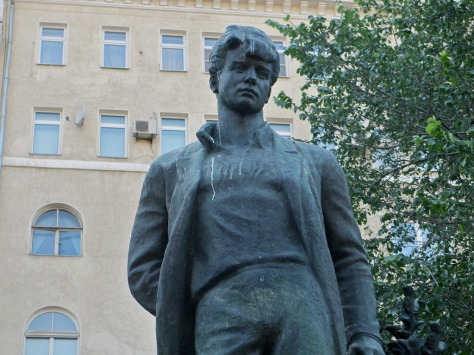SERGEI ESENIN
At the field of fiery eyes,
Divigated a lot of eyes with hope.
Picked up fire (picked up sorrow),
But scants didn’t become full.
Winds of the elf eyes
Brought a message from dolours,
But it was neither zer nor zabar.
In the skies of that look,
The sun ruled and didn’t sink.
The merciful moon is in my eyes,
It took my pains into its soul.
I burned on the fire of a look,
Again, but I couldn’t die.
A soul is one pent, this flirty lovable –
The ivied fire of love to my heart.
--tr. Asror Allayarov, from "The Gate Opened by Angels"

Sergei Yesenin -- A. A. Bichukov
Zer and zabar are Arabic vowel signs. The Arabic script is an impure abjad, a type of writing system in which each symbol stands for a consonant, leaving the reader to supply the appropriate vowel. It is impure in that short consonants and long vowels are represented by letters, but short vowels and consonant length are not generally indicated in writing. A zer is a diagonal line under a consonant to represent the short "i" sound. A zabar is an oblique dash over a consonant that generally represents the short "a" sound.
ReplyDeleteSergei Alexandrovich Yesenin (or Esenin) was one of the most popular Russian poets of the 20th century, known for poignant verse about love and the simple life. With Anatoly Marienhof, he founded Russian literary imaginism. Born into a peasant family in Ryazan, he began to write poetry at the age of nine. At 20 he moved to Petrograd (St. Petersburg), where (according to Yesenin) Andrei Bely gave him the meaning of form and while Alexander Blok and Nikolai Klyuev taught him lyricism. A year later he published his first book, and in 1918 he founded his own publishing house, the Labor Company of the Artists of the Word. Together with Anatoly Marienhof, they founded the Russian literary movement of imaginism.He briefly supported the Bolseviks and their October Revolution but soon became disillusioned and sometimes criticized them in such poems as "The Stern October Has Deceived Me." In 1921, at 26, he met the controversial American dancer Isadora Duncan, a woman 18 years his senior. She knew only a dozen words in Russian, and he spoke no foreign language. But they married in 1922, he for the 3rd time, and toured Europe and the United States. The marriage lasted a year. After his return from the US he name began to appear more often in newspaper police log sections than in poetry outlets, mainly due to his heavy drinking and public outbursts. In 1923 he became romantically involved with actress Augusta Miklashevskaya, to whom he dedicated several poems, and had a son by the poet Nadezhda Volpin. In 1925 he married a granddaughter of Leo Tolstoy.
ReplyDeleteOn 28 December 1925, a week after he escaped from a mental clinic, he was found dead in his room in the Hotel Angleterre in Leningrad (St. Petersburg). According to official reports, he hanged himself with a belt, but rumors have always circulated that he was assassinated by the NKVD. Known to be orderly in his work, his room was in extreme chaos, with his things scattered on the floor. Most of his manuscripts were missing, including his recent poems and novella, "When I was a boy." He had fresh wounds on his shoulder and forehead, and a bruise under one of his eyes. His death triggered an epidemic of suicides by female fans and others, for instance, a former girlfriend, Galina Benislavskaya, killed herself by his graveside a year after his death. Tatyana Sergeevna Yesenina, his daughter by his 2nd wife, was exiled to Tashkent in 1941 after the murder of her mother by the NKVD; she published a memoir of her father, "The House on the Nikolsky Boulevard," and had many manuscripts that were found after her death, but her novel "Zhenya, the Wonder of the Twentieth Century," was the only work of fiction published in her lifetime. His son by his last marriage, Alexander Esenin-Volpin, also became a poet and a prominent activist in the Soviet dissident movement of the 1960s; in 1972 to emigrated to the US and worked as a mathematician and teacher. Most of Yesenin's poems were not republished until 1966. Wolf Ehrlich claimed that "Goodbye, my friend, goodbye" was given to him the day before his death, when he complained there was no ink in the room so he had been forced to write with his blood. (Ehrlich was executed in 1937.) It was a major inspiration for the song "It Was Written In Blood," by the British rock band Bring Me the Horizon on their album "Suicide Season."
Goodbye, my friend, goodbye
My love, you are in my heart.
It was preordained we should part
And be reunited by and by.
Goodbye: no handshake to endure.
Let's have no sadness — furrowed brow.
There's nothing new in dying now
Though living is no newer.